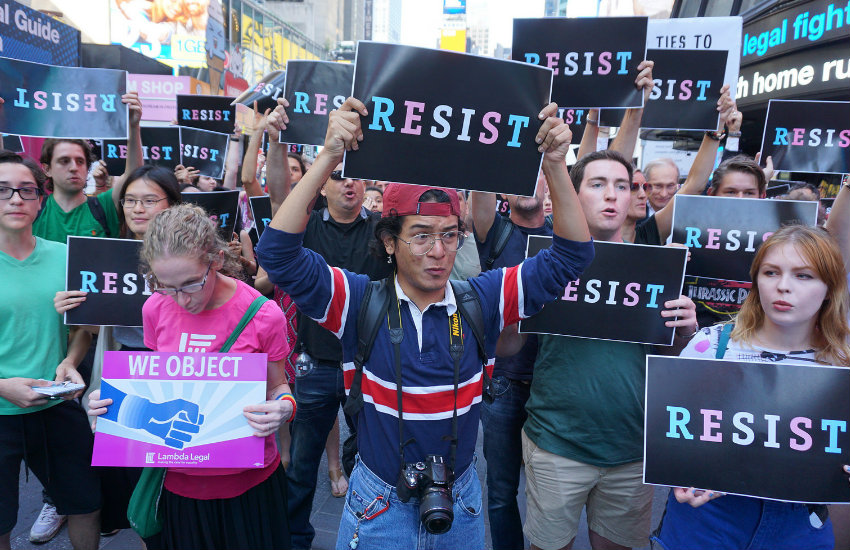People protesting the trans military ban in NYC | Photo: Flickr/Andrew Dallos
Tomorrow is the one-year mark of Donald Trump’s tweet announcing the transgender military ban.
As the situation becomes more complicated, GSN participated in a call about the current and future state of the ban.
There have been numerous court victories, as well as public support for trans troops. Yet the Trump administration continues to block their path to service.
The call included Senator Kirsten Gillibrand (D-NY), Rep. Adam Smith (D-WA), Sasha Buchert from Lambda Legal, Sarah McBridge from the Human Rights Campaign, Peter Perkowski from OutServe-SLDN, and Ashley Broadway-Mack of the American Military Partner Association.
An insult to their bravery
‘Transgender men and women all around the world put on their uniforms, showed up for work, and were told by their commander-in-chief via Twitter that he didn’t want them in “any capacity”,’ Gillibrand recalled with passion on the call.
‘These service members, as you know, are willing to die for this country. That announcement and that policy are an insult to their bravery and their honorable service.’
She further shut down arguments for the ban, saying it in fact makes the military ‘weaker’, wastes taxpayers’ money, and any argument against diversity is ‘plain old wrong’.
Gillibrand has been against the ban since the start, introducing a bill to block it soon after it was announced.
Smith agreed with Gillibrand and doubled down on her statements.
‘There is almost no support for this,’ he said. ‘This was purely a political move.’
Where are we now?
There are numerous litigation cases currently going through the court system challenging the ban.
As Buchert said, Lambda Legal, who was one of the first organizations to take action against Trump, has a case that is expected to go to trial early next year.
Despite the previous court wins, which is why activists are focusing on litigation rather than legislation, McBride said, this matter could go on for some time.
‘It could be a while until the issue is finally resolved,’ Buchert said. While she couldn’t give a firm timeline, she did say it could last a year or two depending on how fast the cases move. Currently, there are four cases in motion challenging the ban.
She also added both sides would likely appeal any decision that goes against their stance.
Its furthest reaches
The call highlighted the danger this administration, and this ban, poses to transgender people going forward.
‘In just a year and a half,’ McBride said. ‘This administration has become the most explicitly anti-transgender administration in history.’
‘This case could easily end up in the Supreme Court,’ Buchert warned. ‘We are deeply concerned with, and opposing the nomination of Judge Kavanaugh.’
She finished: ‘As a former Marine, and as a transgender person, I am extremely proud to work on this case. I’m also extremely proud and deeply moved by the fortitude and bravery of transgender service members who, despite being targeted for who they are, continue to literally put their lives on the line to defend our country.’







